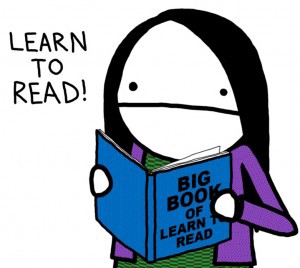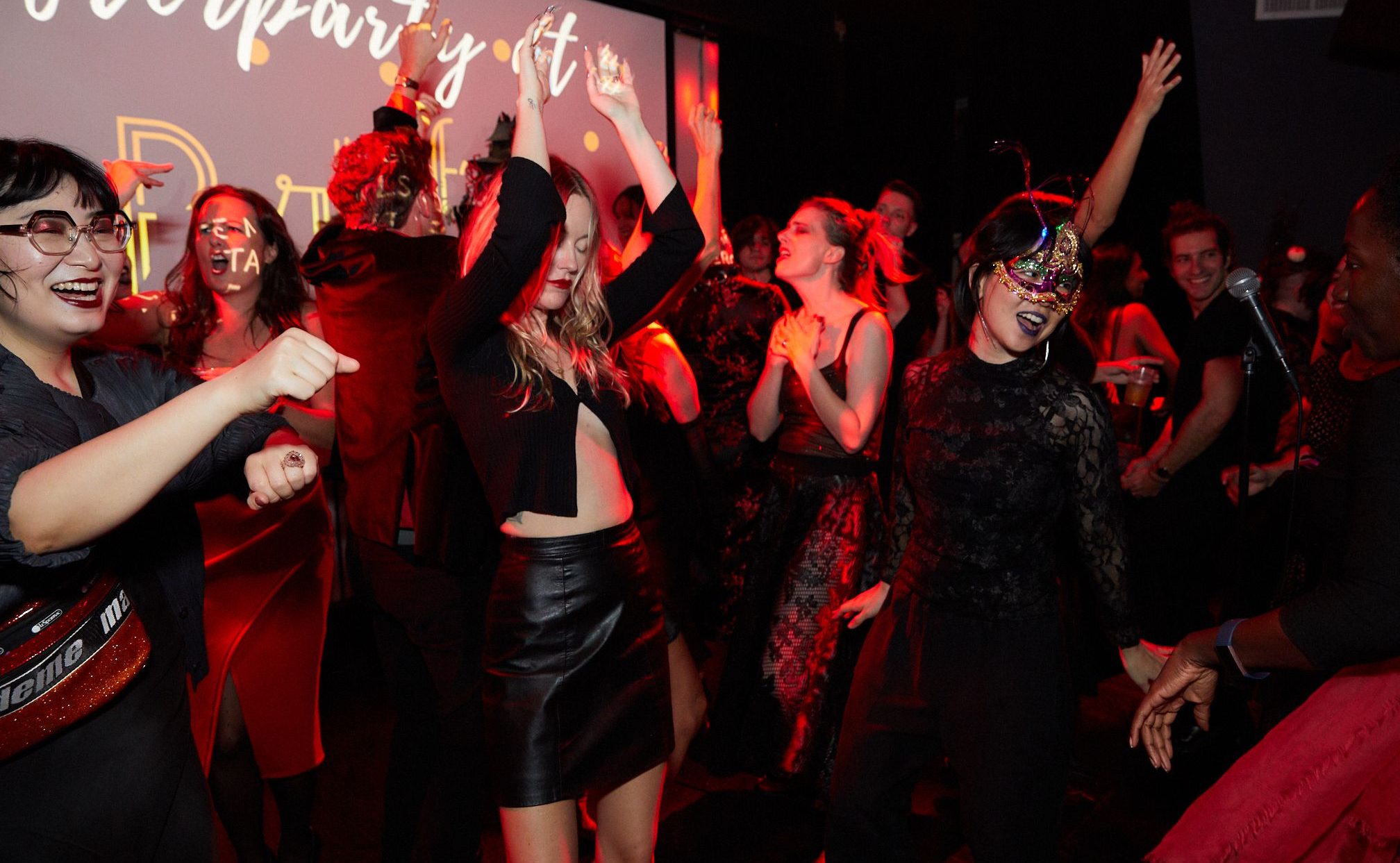news
Franklin Park Reading Series Turns Four!

1. Next month, I promise to be wittier in this caption. 2. Unnameable Books’ Constructivist merch display.

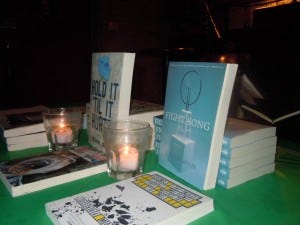
Last night, the Franklin Park Reading Series celebrated its fourth birthday. That’s 48 readings, 240 authors, thousands of eager and bookish attendees, innumerable pints of beer, and way too many book giveaways to tally. Doing anything for four years on-the-regular in New York City is difficult enough, but when you’re doing it in the service of a community whose bread and butter is routinely questioned as a dying medium (pah), you are something else: a creature that lives books. Penina Roth, tireless and tenacious host and founder of the series, is that something else. So last night, in true literary form, we celebrated the toddler-aged series with tales of murder-suicide, a guy named Walt Whitman and his empty house, Achilles learning to love through murder, marital dejection, and even some poems examining chewing gum’s ontological immortality. Guys and gals, it was awesome. There were even cookies for the taking.
1. Geo Ong, bookseller and Urchin Mover, with Marguerite Preston, prima baker. 2. Eric Nelson, on the legacy of Walt Whiman.

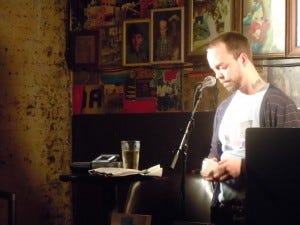
First up was sometimes Outlet contributor Eric Nelson, who also runs a reading series (Fireside Follies) and is the author of a book called The Walt Whitman House. Nelson approached the mic hoisting a vintage tape deck crooning hip-hop beats over his head. Appropriately, Nelson introduced himself with a quote from Whitman. “It’s hard out here for a pimp, when he tryin’ to get his money for the rent.” Two youths in Camden, NJ, Big Rick and Boo, who only have a “nickel, a gum wrapper, and a loose” to share between them, set out into the world looking for said money, among other things. “‘Why don’t you come home,’” a dude on the corner asks them, ‘“Mom missing you.’ Both of us knew this was a lie.” After Whitman, with the slow and steady decrease in poetry’s popularity, Nelson’s book asks: where is youth now? “Some fucking old poet lived here,” Big Rick observes when they reach the house. “I wish the foster house was nice as this,” Boo says.
1. Erika Anderson: “My wish changed to dying first.” 2. Ryan Folan, Fertilizer in Fort Greene; JoAnn DeLuna, a freelance journalist; and Allie Moh, London-via-New York fiction writer.


Next up was Erika Anderson, who is a maven in her own right: Sackett Street Writers’ Workshop instructor, Guernica editorial assistant, co-host of the Renegade Reading Series, and The Outlet’s very own co-editor. She is also a memoirist, and bad-ass one at that. Anderson gave us a glimpse of her memoir-in-progress, [Breathing through Broken], which takes place during and after a stint as an RA in college, and a murder-suicide. “Ever since I could read, I read the obituaries … I turned loss into a mathematical certainty.” Anderson’s relation to a couple and their murder-suicide, is tense and tricky. “What I know about them comes from what I knew then — from Neenef’s suicide note, from what Maggie’s mother has told me … what I don’t know I fill in with my imagination.” Anderson wed tenderness and regret without regressing into schmaltz — her mourning of not only these two lives but of the utter senselessness and alterity of youth abruptly cut was sincere to the bone. It reminded me of an idea of Montaigne’s, that to philosophize is to learn how to die: in our time when young death is becoming “as obvious as another school shooting,” should we be rethinking how we treat death? What’s happening to the youth? All to say, be on the look-out for this book.
1. Adam Tobin: “I’m not fluid in body language.” 2. Allison Devereux, Foreign Rights Assistant at Wolf Literary, with Emily Wunderlich, Editorial Assistant at Penguin Group.
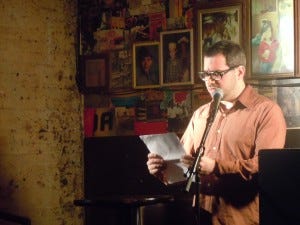

Last before the break was Adam Tobin, a poet and proprietor of the Prospect Heights mainstay Unnameable Books. Tobin’s poems had a wonderful mix of slapstick, skepticism, and sensitivity looming over them. Take this line, from “Any Group Can Claim Responsibility”: “When I find gum in my mouth / I chew, wanting to diminish it // It doesn’t.” Or: “It is difficult / but not impossible to slip on a banana peel.” My favorite of the night was “Air: the problem again.” “You are walking under a thin roof / It can be a real misunderstanding / I asked a doctor about my skin problem.” Look for his poems in journals like FENCE, or head over to Unnameable Books and ask him just how difficult slipping on banana peels is or why “Lyric poets go to hell.”
1. Do not fuck with T. Geronimo Johnson.
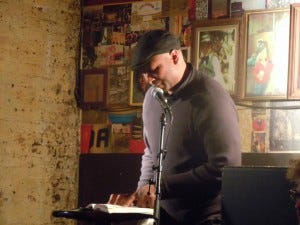
After the break, T. Geronimo Johnson read us a scene that his editor wanted struck from his novel Hold It ’Til It Hurts. Johnson asks “How do you come to love people who are unlike you?” with his main character Achilles, whom we meet sitting around in apartment with a bunch of dogs. The narration is innocent enough at first — Achilles observing two dogs getting to know each other, running to and fro from their cages. Then he’s cutting one of the dog’s throats: “It was like cutting leather with safety scissors. … Throat clean open, it runs its head into the carpet … twitching only occasionally as dogs do when they’re sleeping.” There’s the sense that despite the seemingly senseless brutality, Achilles is learning some kind of lesson, especially when a kid from across the hall bursts into the apartment, looking to hustle. Achilles, ever the savior, pays the kid $15 for the rest of his cigarettes, because “kids shouldn’t smoke.” Exit kid, off to buy three packs of cigarettes.
1. Joshua Mohr: “There are always new ways to disappoint your partners.”
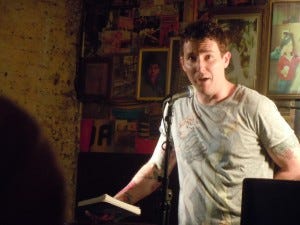
Joshua Mohr closed off the night, and brought some welcome California vibes with his new book Fight Song. Namely: dejection, loneliness, and a late night visit to Mexican fast food drive-thru lanes. We met Bob Coffen, the “capitán of Mexican lasagna,” getting stuck behind an idling car in Taco Shed’s drive-thru. Then, a voice from the intercom: “Are you gonna yank my hair, Otis, you big fucking goat?” Otis, who apparently visits the intercom to, um, enjoy himself, passed out in the car with a bottle of whiskey, has prevented Coffen from getting his Mexican lasagna. “I’m a paying customer,” Coffen says to Tilda, the many-muscled woman behind the intercom. Tilda makes a deal with Coffen in exchange for his silence: three Mexican lasagnas. “The capitán of Mexican lasagna is no friend of the policía,’ Coffen promises. You should probably buy Fight Song, if not for the above scene, then for this line: “Bob jerked his prick, bright fluorescent orange.”
Before Mohr started his reading, he thanked Penina and crew for the work and care for the series and led us in a round of happy birthday. Reprise: Happy birthday, Franklin Park Reading Series! What would the literary nightlife be without you? It’s fifth year is starting out with a huge bang, and April’s headliner needs no introduction: Amy Hempel. The excellent Teddy Wayne (The Love Song of Johnny Valentine), Fiona Maazel (Woke Up Lonely), David Gilbert (The Normals), and Maris Kreizman (“Slaughterhouse 90210”) are also coming to hang. C’mon!
***
— Ryan Chang regularly appears in his bedroom. He tweets here and tumbles here.





